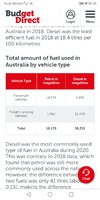over9k
So I didn't tell my wife, but I...
- Joined
- 12 June 2020
- Posts
- 5,470
- Reactions
- 7,932
"Global electric vehicle supremacy will arrive by 2033 -- five years earlier than previously expected -- as tougher regulations and rising interest drive demand for zero-emission transportation, according to a new study.
Consultant Ernst & Young LLP now sees EV sales outpacing fossil fuel-burners in 12 years in Europe, China and the U.S. -- the world’s largest auto markets. And by 2045, non-EV sales are seen plummeting to less than 1% of the global car market, EY forecast using an AI-powered prediction tool".
https://www.bloomberg.com/news/arti...-cars-coming-faster-than-expected-study-shows
Will probably make most peoples' morning brief this evening but we'll see if tesla, nio et al bounce in response.
Consultant Ernst & Young LLP now sees EV sales outpacing fossil fuel-burners in 12 years in Europe, China and the U.S. -- the world’s largest auto markets. And by 2045, non-EV sales are seen plummeting to less than 1% of the global car market, EY forecast using an AI-powered prediction tool".
https://www.bloomberg.com/news/arti...-cars-coming-faster-than-expected-study-shows
Will probably make most peoples' morning brief this evening but we'll see if tesla, nio et al bounce in response.



